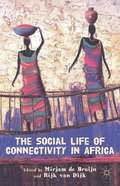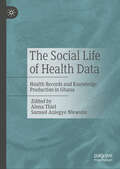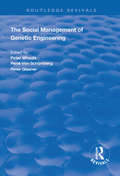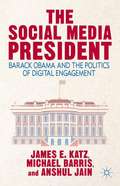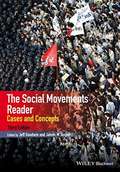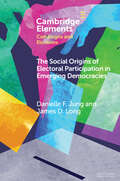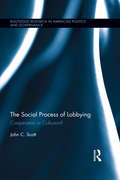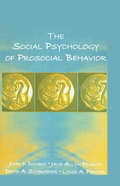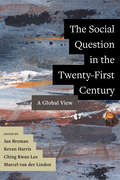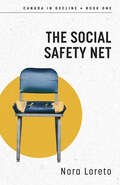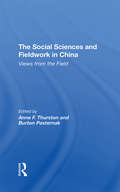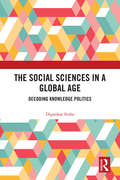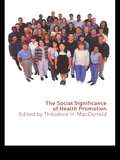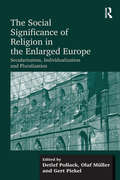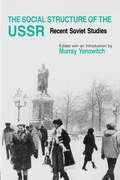- Table View
- List View
The Social Life of Connectivity in Africa
by Mirjam De Bruijn Rijk Van DijkThe rapid increase in adoption of modern 'connective' technologies like the mobile phone has reshaped the social landscape of Africa. This book examines the myriad possibilities that the post-global moment offers African societies to develop and to relate, offering profound new insights into the processes of globalization.
The Social Life of Hagiography in the Merovingian Kingdom
by Jamie KreinerThis book charts the influence of Christian ideas about social responsibility on the legal, fiscal and operational policies of the Merovingian government, which consistently depended upon the collaboration of kings and elites to succeed, and it shows how a set of stories transformed the political playing field in early medieval Gaul. Contemporary thinkers encouraged this development by writing political arguments in the form of hagiography, more to redefine the rules and resources of elite culture than to promote saints' cults. Jamie Kreiner explores how hagiographers were able to do this effectively, by layering their arguments with different rhetorical and cognitive strategies while keeping the surface narratives entertaining. The result was a subtle and captivating literature that gives us new ways of thinking about how ideas and institutions can change, and how the vibrancy of Merovingian culture inspired subsequent Carolingian developments.
The Social Life of Health Data: Health Records and Knowledge Production in Ghana
by Alena Thiel Samuel Aniegye NtewusuThis book takes the contemporary moment of digital health infrastructuring in Ghana as a starting point to examine the genealogies of oral, paper-based and digital forms of knowledge production about health. In view of this multiplicity of forms, the chapters adopt a broad definition of health data that encompasses databases, statistics as well as oral and written records and reports about health. In addition to close historiographic insights into the interactions of indigenous and colonial ways of organising knowledge around health, the chapters explore contemporary ways in which medical professionals are mobilized or potentially demobilized by the standards, methods and calculative devices that accompany the increasing production of health data. The authors show that the contemporary hype around the datafication of health is neither new nor exceptional, but instead needs to be read in broader historical perspective. Through its unique combination of historical, sociological and ethnographic methods, the book shows that the regulation and standardization of health produces both mobilizations and demobilizations, as well as appropriations and resistances.
The Social Management of Genetic Engineering (Routledge Revivals)
by Peter Wheale René von SchombergFirst published in 1998, this volume why and how genetic engineering has emerged as the technology most likely to change our lives, for better or worse, in the opening century of the third millennium. Over twenty international experts, including moral philosophers and social scientists, describe the issues and controversies surrounding modern biotechnology and genetic engineering. They explore ways in which lay individuals and groups can join in an effective and constructive dialogue with scientists and industrialists over the assessment, exploitation and safe management of these new and important technologies. Topics covered include a discussion of the issues surrounding ‘Dolly’, the cloned sheep, the politics and ethics of the international research programme to sequence the entire human genome, the ethical questions raised by the creation of transgenic farm animals, the morality of genetic experimentation on animals, the controversy surrounding the patenting of genetic material and of the transgenic animals themselves, the ethical implications of engineering animals for transplanting their organs into humans, and the environmental hazards of releasing genetically engineered organisms.
The Social Media President
by James E. Katz Michael Barris Anshul JainThe proliferation of social media has altered the way that people interact with each other - leveling the channels of communication to allow an individual to be "friends" with a sitting president. In a world where a citizen can message Barack Obama directly, this book addresses the new channels of communication in politics, and what they offer.
The Social Movements Reader: Cases and Concepts Third Edition
by Jeff Goodwin James M. JasperProviding a unique blend of cases, concepts, and essential readings The Social Movements Reader, Third Edition, delivers key classic and contemporary articles and book selections from around the world. Includes the latest research on contemporary movements in the US and abroad, including the Arab spring, Occupy, and the global justice movement. Provides original texts, many of them classics in the field, which have been edited for the non-technical reader. Combines the strengths of a reader and a textbook with selected readings and extensive editorial material.
The Social Origins of Electoral Participation in Emerging Democracies (Elements in Campaigns and Elections)
by James D. Long Danielle F. JungGiven the enormous challenges they face, why do so many citizens in developing countries routinely turn out to vote? This Element explores a new explanation grounded in the social origins of electoral participation in emerging democracies, where mobilization requires local collective action. This Element argues that, beyond incentives to express ethnic identity and vote-buying, perceptions of social sanctioning from community-based formal and informal actors galvanize many to vote who might otherwise stay home. Sanctioning is reinforced by the ability to monitor individual turnout given the open layout and centralized locations of polling stations and the use of electoral ink that identifies voters. This argument is tested using original survey and qualitative data from Africa and Afghanistan, contributing important insights on the nature of campaigns and elections in the promotion of state-building and service delivery, and the critical role voters play reducing fears of global democratic backsliding.
The Social Origins of Human Rights
by Luis Van IsschotHuman rights activism is often associated with international organizations that try to affect the behavior of abusive states around the globe. In Barrancabermeja, Colombia, argues Luis van Isschot in "The Social Origin of Human Rights," the struggle for rights has emerged more organically and locally, out of a long history of civil and social organizing. He offers deep insight into the lives of home-grown activists in a conflict zone, against the backdrop of major historical changes that shaped Latin America in the twentieth century. Built by Standard Oil in 1919, and home to the largest petroleum refinery in the country, Barrancabermeja has long been a critical battleground in Colombia s armed conflict. One of the most militarized urban areas on earth, the city has been a regional base for the Colombian armed forces as well as for leftist guerrillas and a national paramilitary movement. In the midst of a dirty war in which the majority of victims were civilians, urban and rural social movements from Barrancabermeja and the surrounding area came together to establish a human rights movement. These frontline activists called upon the Colombian state to protect basic human rights and denounced the deeper socioeconomic inequalities they saw as sources of conflict. Through close study of the complex dynamics at work in Barrancabermeja, van Isschot shows how the efforts we describe as human rights activism derive in large part from these lived experiences of authoritarianism, war, poverty, and social exclusion. Through its social and historical approach, his analysis both complements and challenges the work of scholars who look at rights issues primarily through a legal lens. "
The Social Outburst and Political Representation in Chile (Latin American Societies)
by Bernardo Navarrete Victor TricotThis is the first book in English to present a comprehensive analysis of the October 2019 social outbreak in Chile and its consequences for the country’s political system. For almost 30 years (1990-2019), Chile was recognized as a model of political and economic stability in Latin America, but the 2019 protests put into question the whole structure of representation based on programmatic political parties. This contributed volume analyzes the causes of the social outbreak by examining the interaction between political parties and social movements in Chile since 2000, establishing bridges between the sociology of social movements and the political science of parties and forms of traditional political representation. The book is organized in three parts. The first part analyzes the collapse of the political party system in Chile. The second part shows how social movements introduced innovative forms of political mobilization that challenged the traditional forms of political representation. Finally, the third part presents case studies focusing on specific social movements and their contributions to the renewal of political representation in Chile. The Social Outburst and Political Representation in Chile will be a valuable resource for sociologists, political scientists and other social scientists interested in understanding the challenges posed to political parties and institutions by social movements formed by citizens who no longer see themselves represented by the traditional forms political participation.
The Social Politics of Medieval Diplomacy: Anglo-German Relations (1066-1307)
by Joseph P. HuffmanLate nineteenth- and twentieth-century political and intellectual boundaries have heavily influenced our views of medieval Germany. Historians have looked back to the Middle Ages for the origins of modern European political crises. They concluded that while England and France built nation-states during the medieval era, Germany--lacking a unified nation-state--remained uniquely backward and undeveloped. Employing a comparative social history, Huffman reassesses traditional national historiographies of medieval diplomacy and political life. Germany is integrated into Anglo-French notions of western Europe and shown to be both an integral player in western European political history as well as a political community that was as fully developed as those of medieval England or France. The Social Politics of Medieval Diplomacyoffers a study of the social dynamics of relations between political communities. In particular, the Anglo-French political communities do not appear as state and constitution builders, while the German political community is not as a state and constitution destroyer. The book concludes by encouraging medievalists to integrate the German kingdom into their intellectual constructs of medieval Europe. This book is an essential history of medieval Germany. It bridges the gaps between Anglo-French and German scholarship and political and social history. Joseph Huffman makes available German-language scholarship. Both English and German history is integrated in an accessible and interesting way. The historiographical implications of this study will be far-reaching. Joseph P. Huffman is Associate Professor of History and Political Science, Messiah College.
The Social Practice of Human Rights
by Joel R. PruceThe Social Practice of Human Rights bridges the conventional scholar-practitioner divide by focusing on the space in between. In capturing this cutting edge research program, the volume proposes a perspective that motivates critical self-reflection of the strategies that drive communities dedicated to the advocacy and implementation of human rights. The social practice of human rights takes place not in front of a judge, but in the streets and alleys, in the backrooms and out-of-the-way places where change occurs. Contributors to this volume investigate the contexts and efforts of activists and professionals devoted to promoting human rights norms. This research takes as its subject the organizations and movements that shoulder the burden of improving respect for human dignity—and through a constructive critique of these patterns and practices, scholarship can have a positive impact on the political world.
The Social Process of Globalization
by Douglas W. BlumIt is often argued that globalization fosters 'hybridity', as some cultural imports are accepted, while others are 'localized', and others still are rejected outright. Yet we know relatively little about the social processes and mechanisms involved in cultural globalization. This book offers an empirically rich and theoretically compelling analysis of how cultural globalization occurs, including the structural conditions, personal meanings and social interactions associated with various outcomes. Providing a detailed analysis of the experiences of young people from Kazakhstan who lived in the United States temporarily, the author asks, how do return migrants react to cultural differences in America, and what changes do they try to incorporate into their lives back in Kazakhstan? What kinds of negotiations ensue, and what explains their success or failure? In answering these questions, Douglas W. Blum combines insights from sociology and anthropology along with specialized research on globalization, migration and post-Soviet studies.
The Social Process of Lobbying: Cooperation or Collusion? (Routledge Research in American Politics and Governance #19)
by John C. ScottDespite a wealth of theorizing and research about each concept, lobbying and norms still raise a number of interesting issues. Why do lobbyists and politicians engage in cooperative behavior? How does cooperative behavior in lobbying affect policy making? If democratic participation is good, why do we view lobbying as bad? Lobbying engenders debate about its effects on the political process and on policy development. Sociologists and other social scientists remain concerned about how norms emerge, the content of norms, how widely they are distributed, and how they are enforced. Political scientists study how interest groups work together and influence the political process. Based on the experience of the author, a former lobbyist, this book looks at the social norms of lobbying and how such norms work in a general framework of other norms and legal institutions in the political process. In developing this argument, John C. Scott claims that: Embedded social relationships and trust-based social norms underpin everyday interactions among policy actors. These relationships and norms have concrete impacts on the policy making process. Social relationships and norms inhibit participation in the political process by outside actors. The investigation is conducted through an innovative theoretical framework, combining existing theoretical perspectives from different disciplines, and using a variety of data and methods, including longitudinal quantitative and social network data, interviews with lobbyists, activists, and policymakers, and anecdotal and historical examples. The Social Process of Lobbying provides refreshingly new empirical evidence and theoretical analysis on how networks of trust are neither all good nor all bad but are ambivalent: they can both improve policy and fuel collusion.
The Social Project: Housing Postwar France
by Kenny CupersWinner of the 2015 Abbott Lowell Cummings prize from the Vernacular Architecture Forum Winner of the 2015 Sprio Kostof Book Award from the Society of Architectural Historians Winner of the 2016 International Planning History Society Book Prize for European Planning History Honorable Mention: 2016 Wylie Prize in French Studies In the three decades following World War II, the French government engaged in one of the twentieth century&’s greatest social and architectural experiments: transforming a mostly rural country into a modernized urban nation. Through the state-sanctioned construction of mass housing and development of towns on the outskirts of existing cities, a new world materialized where sixty years ago little more than cabbage and cottages existed.Known as the banlieue, the suburban landscapes that make up much of contemporary France are near-opposites of the historic cities they surround. Although these postwar environments of towers, slabs, and megastructures are often seen as a single utopian blueprint gone awry, Kenny Cupers demonstrates that their construction was instead driven by the intense aspirations and anxieties of a broad range of people. Narrating the complex interactions between architects, planners, policy makers, inhabitants, and social scientists, he shows how postwar dwelling was caught between the purview of the welfare state and the rise of mass consumerism.The Social Project unearths three decades of architectural and social experiments centered on the dwelling environment as it became an object of modernization, an everyday site of citizen participation, and a domain of social scientific expertise. Beyond state intervention, it was this new regime of knowledge production that made postwar modernism mainstream. The first comprehensive history of these wide-ranging urban projects, this book reveals how housing in postwar France shaped both contemporary urbanity and modern architecture.
The Social Psychology of Everyday Politics
by Caroline Howarth Eleni AndreouliThe Social Psychology of Everyday Politics examines the ways in which politics permeates everyday life, from the ordinary interactions we have with others to the sense of belonging and identity developed within social groups and communities. Discrimination, prejudice, inclusion and social change, politics is an on-going process that is not solely the domain of the elected and the powerful. Using a social and political psychological lens to examine how politics is enacted in contemporary societies, the book takes an explicitly critical approach that places political activity within collective processes rather than individual behaviors. While the studies covered in the book do not ignore the importance of the individual, they underscore the need to examine the role of culture, history, ideology and social context as integral to psychological processes. Individuals act, but they do not act in isolation from the groups and societies in which they belong. Drawing on extensive international research, with contributions from leaders in the field as well as emerging scholars, the book is divided into three interrelated parts which cover: The politics of intercultural relations Political agency and social change Political discourse and practice Offering insights into how psychology can be applied to some of the most pressing social issues we face, this will be fascinating reading for students of psychology, political science, sociology and cultural studies, as well as anyone working in the area of public policy.
The Social Psychology of Prosocial Behavior
by Louis A. Penner John F. Dovidio Jane Allyn Piliavin David A. SchroederWritten by four leading researchers in the study of prosocial behavior, this book introduces a new perspective on prosocial behavior for the 21st century. Building on the bystander intervention work that has defined this area since the 1960s, The Social Psychology of Prosocial Behavior examines prosocial behavior from a multilevel perspective that explores the diverse influences that promote actions for the benefit of others and the myriad ways that prosocial actions can be manifested. The authors expand the breadth of the field, incorporating analyses of biological and genetic factors that predispose individuals to be concerned for the well being of others, as well as planned helping such as volunteering and organizational citizenship behavior and cooperative behavior within and between groups. They identify both the common and the unique processes that underlie the broad spectrum of prosocial behavior.Each chapter begins with a question about prosocial behavior and ends with a summary that answers the question. The final chapter summarizes the questions and the answers that research provides. Conceptual models that elaborate on and extend the multilevel approach to prosocial behavior are used to tie these findings together. The book concludes with suggestions for future research. The Social Psychology of Prosocial Behavior addresses the following:*the evolution of altruistic tendencies and other biological explanations of why humans are predisposed to be prosocial;*how the situation and motives that are elicited by these situations affect when and how people help;*the causes and maintenance of long-term helping, such as volunteering;*how prosocial behavior changes over time and the developmental processes responsible for these changes;*the consequences of helping for both the people who provide it and those who receive it;*helping and cooperation within and between groups and the implications of these actions.This accessible text is ideal for advanced courses on helping and altruism or prosocial behavior, taught in psychology, sociology, management, political science, and communication, or for anyone interested in learning more about prosocial behavior in general.
The Social Question in the Twenty-First Century: A Global View
by Ching Kwan Lee Jan Breman Kevan Harris Marcel van der LindenA free open access ebook is available upon publication. Learn more at www.luminosoa.org. Want, disease, ignorance, squalor, and idleness: first recognized together in mid-nineteenth-century Europe, these are the focus of the Social Question. In 1942 William Beveridge called them the “giant evils” while diagnosing the crises produced by the emergence of industrial society. More recently, during the final quarter of the twentieth century, the global spread of neoliberal policies enlarged these crises so much that the Social Question has made a comeback. The Social Question in the Twenty-First Century maps out the linked crises across regions and countries and identifies the renewed and intensified Social Question as a labor issue above all. The volume includes discussions from every corner of the globe, focusing on American exceptionalism, Chinese repression, Indian exclusion, South African colonialism, democratic transitions in Eastern Europe, and other phenomena. The effects of capitalism dominating the world, the impact of the scarcity of waged work, and the degree to which the dispossessed poor bear the brunt of the crisis are all evaluated in this carefully curated volume. Both thorough and thoughtful, the book serves as collective effort to revive and reposition the Social Question, reconstructing its meaning and its politics in the world today.
The Social Safety Net: Canada in Decline Book One (Canada in Decline #1)
by Nora LoretoCanada’s social safety net is fraying. Why does it feel like everything is collapsing?Canada is at a crossroad. Neoliberalism has hollowed out and sold off the social services Canadians rely on now more than ever, and has brought into stark relief the dissonance among colonial, Indigenous, and some of Canada's most at-risk groups.The Social Safety Net tracks the forty-year attack on Canada’s social safety net. As neoliberalism has matured in Canada, Canadians are seeing the impact of these attacks: unreliable health services, crises in education and social services, and a society that feels like it is losing cohesion.The first volume in a series by activist, author, and journalist Nora Loreto, the Canada in Decline series is the story of Canada’s untenable status quo and the forces that have led us to where we are today. It outlines the choices we need to make as well as the possible paths forward to fix all that is crumbling around us.
The Social Sciences And Fieldwork In China: Views From The Field
by Anne F Thurston Burton PasternakFollowing the formation of the Chinese Academy of Social Sciences in 1977 and the beginning of a Sino-American scholarly exchange program in October 1978, a small number of foreigners has been able to conduct fieldwork in China after a hiatus of over thirty years. Welcomed though these new opportunities were by potential U.S. field researchers, the initial stage of enthusiasm was shortly overshadowed by both the difficulties foreign researchers faced in China and the imposition, in early 1981, of a temporary moratorium on long-term fieldwork by outsiders. Sober without being pessimistic, realistic without being discouraging, the contributors to this book describe the context in which fieldwork in China became possible, the constraints under which foreign fieldworkers have labored, and the potential rewards of field research to both Chinese and U.S. scholars. They also assess the relative value of fieldwork in China versus fieldwork at its gate, Hong Kong. The book includes substantive reports by U.S. and Chinese scholars (among them Fei Xiaotong, China's preeminent social anthropologist) as well as concrete advice to those contemplating field research in China.
The Social Sciences in a Global Age: Decoding Knowledge Politics
by Dipankar SinhaThe book focuses on the status and role of social sciences in the current millennium. Drawing inspiration from a range of theorists, it critically examines the key debates on the social science stream and focuses on its ir/relevance in our times in the background of changing state-market dialectics. It specifically scrutinises knowledge politics of the global times to reveal how the neoliberal project aligns and fuses steep economic ‘conditionalities’ with professional cultural parameters of higher academia to constrain autonomy and weaken radical expressions in social science pedagogy and research. Asserting that the humanistic core of social sciences has the potential to resist acts of reducing knowledge to a monochromatic form, the book argues that the social science stream can challenge and resist such hegemonic ambitions. It also identifies and analyses the contradictions, dilemmas, predicaments and false steps of social scientists, and avoids a reductive approach based on the ‘west versus non-west’ binary. The volume will be of interest to scholars and researchers of the social sciences in general, and of sociology/politics of knowledge, political theory, political sociology and education in particular.
The Social Security Primer: What Every Citizen Should Know
by Paul E PetersonOffers a clear understanding of what Social Security has accomplished in the past, challenges it now faces, and possibilities for the future. Outlines the full spectrum of current issues, policies, benefits, and proposed reforms.
The Social Services Crisis of the 1990s: Strategies for Sustainable Systems in Tanzania (Routledge Revivals)
by Anna Kajumulo TibaijukaFirst published in 1998, this volume represents the outcome of a seminar as part of the continuing efforts of the Convocation of the University of Dar es Salam to maintain a dialogue with the Government of Tanzania on its socio-economic problems. Its aim was to underscore heightened public concern on the continued deterioration of social services in Tanzania following the onset of the economic crisis, to examine the effect of structural adjustment policies and measures on health, education, water, food, security, housing and social welfare services and to make specific recommendations on how to improve the delivery and sustainability of social services. This volume reproduces, as far as is practicable, the full proceedings of that important forum, whose issues remain relevant today. Recent reforms in the country, including privatization, graded user fees and decentralized management of social services by local communities have been substantially influenced by what the seminar recommended. While a section of society has welcomed these reforms as the only realistic way to achieve sustainability, reduce donor dependence, and prevent further deterioration of social services, there are still voices which object to the measures. Key questions raised in the book concern citizens’ rights to social services, the regulatory role of government, democratic participation and partnerships between government, NGOs and private providers of social services. It will serve as a reference point for a fresh review of the social services crisis in the 1990’s and the basis for devising more appropriate and sustainable strategies for the 21st Century.
The Social Significance of Health Promotion
by Théodore H. MacDonaldThe Social Significance of Health Promotion sets health promotion in its historical context and delineates its contemporary role. It explores the potential of health promotion to impact on our social values and sense of community. The book begins by exploring the historical roots of health promotion and its relationship to the medical model of health. It moves on to present analyses of contemporary health promotion programmes in which the contributors are actively engaged. These chapters discuss current questions for health promotion from a practitioner perspective and from the point of view of their social impact. They cover a wide range of topical issues such as exclusion and inclusion, the mental health of children, the role of alternative medicine, and health in the workplace.Emphasising the centrality of empowerment, participation and advocacy to an effective health promotion programme, The Social Significance of Health Promotion brings students and health professionals right up to date with the latest initiatives and theories.
The Social Significance of Religion in the Enlarged Europe: Secularization, Individualization and Pluralization
by Olaf MüllerEngaging with some of the central issues in the sociology of religion, this volume investigates the role and significance of churches and religion in contemporary Western and Eastern Europe. Based on an extensive international research project, it offers case studies of various countries (including Finland, Ireland, Portugal, Germany, Poland, Russia, Estonia, Hungary and Croatia), as well as cross-country comparisons. Researching more precisely the present social relevance of church and religion at different levels, The Social Significance of Religion in the Enlarged Europe raises and responds to both descriptive and explanatory questions: Can we observe tendencies of religious decline in the various Western and Eastern European countries? Are we witnessing trends of religious individualization? To what extent has there been a religious upswing in the last few years? And what are the factors causing the observed processes of religious change? Marked by its broad range of data and a coherent conceptual framework, in accordance with which each chapter assesses the extent to which three important theoretical approaches in the sociology of religion - secularization theory, the market model of religion, and the individualization thesis - are applicable to the data, this book will be of interest to scholars of sociology, politics and religion exploring religious trends and attitudes in contemporary Europe.
The Social Structure of the USSR: Recent Soviet Studies
by Murray YanowitchThis is a study of "karayuki-san", impoverished Japanese women sent abroad to work as prostitutes from the 1860s to the 1920s. It follows the life of one prostitute, Osaki, who is persuaded as a child of ten to accept cleaning work in Borneo and then forced to work as a prostitute in a brothel.
